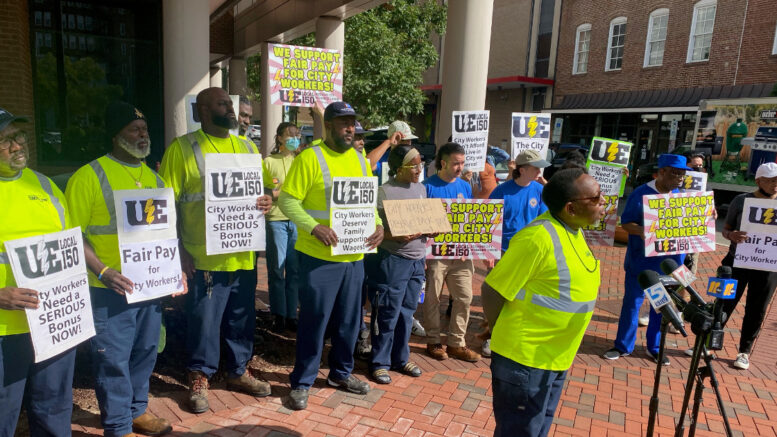By Dante Strobino
On September 6, 2023, over seventy sanitation workers in Solid Waste Management in the City of Durham did not load their trucks in protest of low pay. On the first day of the action, only one garbage truck, out of a total of more than 40 trucks, went out on the routes that day. On an average day, city trucks pick up around 20 tons of garbage, yard waste, recycling and bulky items.
Members of the North Carolina Public Service Workers Union, UE Local 150, led the action in response to inaction by city officials on three demands they have been organizing around for several months: 1) An immediate $5000 bonus; 2) Payment to workers for work done outside of their job title; and 3) Hire all temporary workers. Hundreds of city workers across departments signed a petition circulating with these demands, which was presented to City Council on September 5, after other meetings with city leaders around their concerns.
The next day, six supervisors were ordered to drive garbage trucks, and forced the six temporary laborers and the two new employees to get on the back of the trucks. Sanitation workers stayed united through the weekend, even under increasing pressure from management to return to work. Ultimately, they stayed out of work six days and returned to work on their own terms with their heads high, and with a huge boost to their internal solidarity, on September 12.
The action galvanized deep and wide community, faith and labor support across all of Durham, the state and the nation, ultimately winning $6.5 million in bonuses for the city’s lowest paid workers. It has the potential to be a spark for municipal and other workers who are in anti-union South to launch their own fight back campaigns. Workers successfully told their stories about understaffing and low wages in the context of an unprecedented local housing crisis and deepening gentrification in Durham that has pushed out many working families, who can no longer afford to live in the city limits. Throughout much of the pandemic, nearly a thousand working families were evicted monthly from rental properties across Durham.
Another material reality that workers felt was the increasing understaffing. Vacancies in many departments continued to increase since the “Great Resignation.” In Public Works alone, where there are 177 positions, there were less than 50 workers doing the work.
Even though public sector strikes are technically illegal, over the course of the last few years, sanitation workers have struck in Raleigh (2006), Greenville, NC (2011), Virginia Beach (2020) and Elizabeth City (2021). In contrast to other public sector workers in the three states that ban public sector collective bargaining (South Carolina, North Carolina and Virginia), sanitation workers continue to prove to be a militant leading force in taking collective action on the job. With the exception of the sick-out led by NC Association of Educators on May Day, International Workers Day, May 1, 2019 where tens of thousands of educators across the state did not go to work, and many marched on the state legislature in Raleigh, these are the only public sector strikes in recent years. The right to collectively bargain was won in many states in the 1970’s directly as a result of public workers going on strike and organizing mass collective action.
Surprisingly, even though Durham has the most progressive city council in the state, the city worker’s wages have lagged in recent years. Durham remains the lowest paid municipalities in North Carolina, particularly for sanitation workers. As of October 1, 2023, here are the starting wages for sanitation workers compared to other cities, including many smaller cities:
Durham – $39, 141
Burlington – $40, 500
Greensboro – $43,000
Greenville – $41,000
Raleigh – $41,117
Rocky Mount – $40,516
Charlotte – $45,760
According to a report issued by GoBankingRates (not exactly a pro-worker mouthpiece) in September 2023, a family of four needs to have an income of $84,957 to live comfortably in North Carolina. That is equivalent to two income earners both making at least $20 per hour.
Cities in North Carolina generally keep close to 25 percent of the total General Fund, unspent to help appease Wall Street. These billionaire bankers hold cities hostage to these exorbitant bank reserves lending them large money in the form of bonds, that then must be paid back based on interest rates that they set. Wall Street demands these reserves and other austerity measures in their annual bond rating assessments.
At the end of the FY2023, the city had over $74 million in reserves, over 31 percent of their annual budget. The union demand—to give every worker that earns under $75,000 per year a $5,000 bonus – would cost around $8 million. The city clearly can responsibly spend this money and have plenty to roll over into the current fiscal year for unexpected one-time expenditures. Not to mention, that much of this was directly from the workers sweat and hard work due to vacant positions. At the end of the fiscal year, the city had $5.4 million in lapsed salary funds.
For more information go to southernworkerjustice.org.
Dante Strobino is a union organizer at UE local 150, NC Public Service Workers Union. He currently serves as an International Representative for the UE Southern Sub-region.

